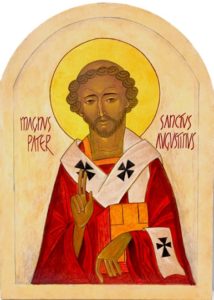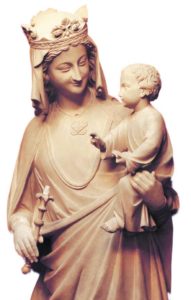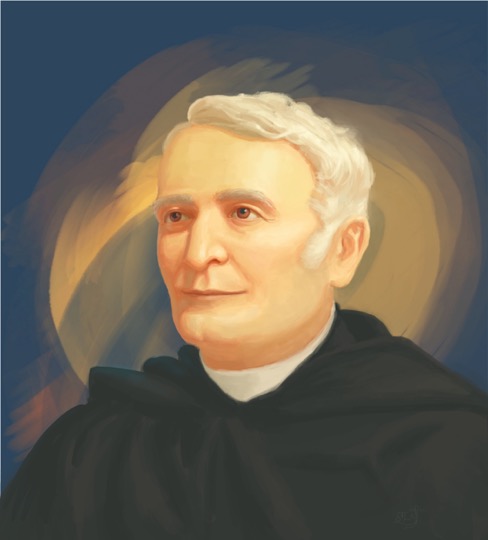An Augustinian Spirituality
St. Augustine, this major father of the Western Church, means a great deal to us. First of all, for his taste for friendship, fraternity, and the ability to unite around him those who seek God and who are determined to follow Christ resolutely, together! Fraternal life, in a family spirit, is therefore essential for us.
Above all, live unanimously at home, having one soul, and one heart turned towards God. Isn’t have the very reason for your gathering?
RULE OF SAINT AUGUSTINE, N°2
Augustine also bequeathed to us his love for the Church, a Church in search of Truth, Charity, and Unity. This love manifests itself as much as in concern for the universal Church, and its great questions, as in the humble service of a concrete Christian community, rooted in a place, in a diocese, in a particular culture. Like Augustine, Bishop of Hippo for 35 years, our founder, Father Emmanuel d’Alzon, remained 39 years at the service of the Diocese of Nîmes as Vicar General, refusing to accept ecclesiastical honors and “going up to Paris.
The deepening of our Augustinian roots manifests itself, especially in the tradition of Augustinian Studies, that high place of Augustinian research with brothers who, from generation to generation, will specialize in Saint Augustine and his thought.

An Alzonian Spirituality
Among the abundance of French foundations in the 19th century, Father Emmanuel d’Alzon sees the bigger picture: he wants a congregation capable of working for an extension of the Reign of God in a post-revolutionary French society that is becoming more and more secularized. He also dreams of a one and resolutely universal Church: from Australia – a land of mission – to Anglican England, passing through Orthodox Bulgaria where there is a vigorous dialogue with the Huguenots of the Cévennes. Nothing displeases him more than narrow, petty, or partisan spirit. He wants bold, generous, selfless men to work passionately to extend the Reign of God in them and around them.
The spirit of the Founder impels us to make the great causes of God and man our own, to carry ourselves to where God is threatened as the image of God
rule of life n°4

To see broadly, it is not a question of developing particular devotions but of focusing on Christ and what he loved most: the Blessed Virgin-His Mother, and the Church- His wife. This is called, in our country, a triple love. But make no mistake, we are not a Marian congregation – our name in this regard can be misleading -, certainly Mary has her place, all her place, but only her place, because Christ is at the Center and the other aspects of our faith revolve around him. In our jargon, we speak of a Christocentric spirituality.
Father d’Alzon was a man of action. Our spirituality is that of men of action and is being expressed through our apostolic commitments and zealous works. We want to be men of faith, of communion, and in solidarity with the poor. This social dimension of our commitments has not diminished over the decades. We are constantly seeking new responses to the challenges that arise around us. From education for all in underprivileged areas to welcoming migrants, through the hospital and prison world, without forgetting the reception of orphans or development actions.

A Conciliar Spirituality
Actor of interreligious dialogue
This Christocentrism has allowed us to make our own the new spirit instilled by the Second Vatican Council in our relationship with Christians of other confessions and believers of other religions. Indeed, by focusing on Christ, it is no longer our particular devotions that are emphasized or the particularisms of each Church but faith in Christ that brings all Christians together. Unity, in the form of a “return” to Catholicism, desired by Father d’Alzon and marked by his times, has predisposed us to enter easily into the movement of ecumenism. It is a unity that leaves room for the diversity of the Christian Churches and an actor in the interreligious dialogue developed more recently. Since the nineteenth century, our tradition is to be present in countries with a majority of Orthodox or Muslims, and an intellectual commitment in this area through Byzantine Studies.
Actor of this world
A second aspect of the Council remains a compass for us, a positive and constructive relationship to the world. We are no longer in the schema of a Church besieged by modernity and on the defensive. But in that of a Church bringing its stone to seek, with all people of goodwill, a world that is more just, more humane, more fraternal that does not forget the spiritual dimension of the human being. Our commitment in the world of the Press, for example, with Bayard, is a good illustration of this positioning.
With the laity
A third conciliar and Assumptionist underline that a church is less clerical and leaves all its place to the laity. Even before founding the religious branch, Father d’Alzon, working in concert with our older sisters – the Sisters of the Assumption – had put in-place its first foundation stone, that of an association of brothers, priests, and laypeople. We spoke of the “Third Order” in the 19th century, and that would become the Lay-Religious Alliance to carry together the charism, this particular way of making Church, that the Lord has entrusted to us.
